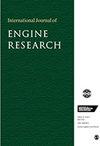Performance and environmental impact of ethanol-kerosene blends as sustainable aviation fuels in micro turbo-engines
IF 2.1
4区 工程技术
Q2 ENGINEERING, MECHANICAL
引用次数: 0
Abstract
The research experimentally examines the viability of ethanol (E) as a sustainable aviation fuel (SAF) when mixed with kerosene (Ke) – Jet A aviation fuel + 5% Aeroshell oil. Various blends of ethanol and kerosene (10%, 20%, and 30% vol. of ethanol added in kerosene) were subjected to testing in an aviation micro turbo-engine under different operational states: idle, cruise, and maximum power. During the tests, monitoring of engine parameters such as burning temperature, fuel consumption, and thrust force was conducted. The study also encompassed the calculation of crucial performance indicators like burning efficiency, thermal efficiency, and specific consumption for all fuel blends under maximum power conditions. Physical-chemical properties of the blends, encompassing density, viscosity, flash point, and calorific power, were determined. Furthermore, elemental analysis and FTIR were used for chemical composition determination. The research delved into analyzing the air requirements for stoichiometric combustion and computed resulting emissions of CO乙醇-煤油混合物作为微型涡轮发动机可持续航空燃料的性能和环境影响
该研究通过实验检验了乙醇(E)与煤油(Ke)(Jet A 航空燃料+5% Aeroshell 油)混合后作为可持续航空燃料(SAF)的可行性。乙醇和煤油的各种混合物(乙醇在煤油中的添加量分别为 10%、20% 和 30%)在航空微型涡轮发动机中进行了不同运行状态下的测试:怠速、巡航和最大功率。测试期间,对燃烧温度、燃料消耗和推力等发动机参数进行了监测。研究还包括计算所有混合燃料在最大功率条件下的燃烧效率、热效率和比消耗等关键性能指标。还测定了混合燃料的物理化学特性,包括密度、粘度、闪点和热功率。此外,还使用了元素分析和傅立叶变换红外光谱来确定化学成分。研究还深入分析了化学燃烧所需的空气,并计算了由此产生的二氧化碳和水的排放量。在 Jet Cat P80® 微型涡轮增压发动机上进行了实验评估,涵盖了起动程序、加速、减速以及发动机不同运行阶段的污染物(一氧化碳和二氧化硫)排放等方面。结果表明,所研究的混合燃料在所有测试条件下都表现出稳定的发动机性能。这表明,这些混合燃料有望成为微型涡轮发动机的可持续航空燃料,在减少污染和为燃料生产提供更无害生态的原材料方面带来好处。
本文章由计算机程序翻译,如有差异,请以英文原文为准。
求助全文
约1分钟内获得全文
求助全文
来源期刊

International Journal of Engine Research
工程技术-工程:机械
CiteScore
6.50
自引率
16.00%
发文量
130
审稿时长
>12 weeks
期刊介绍:
The International Journal of Engine Research publishes high quality papers on experimental and analytical studies of engine technology.
 求助内容:
求助内容: 应助结果提醒方式:
应助结果提醒方式:


